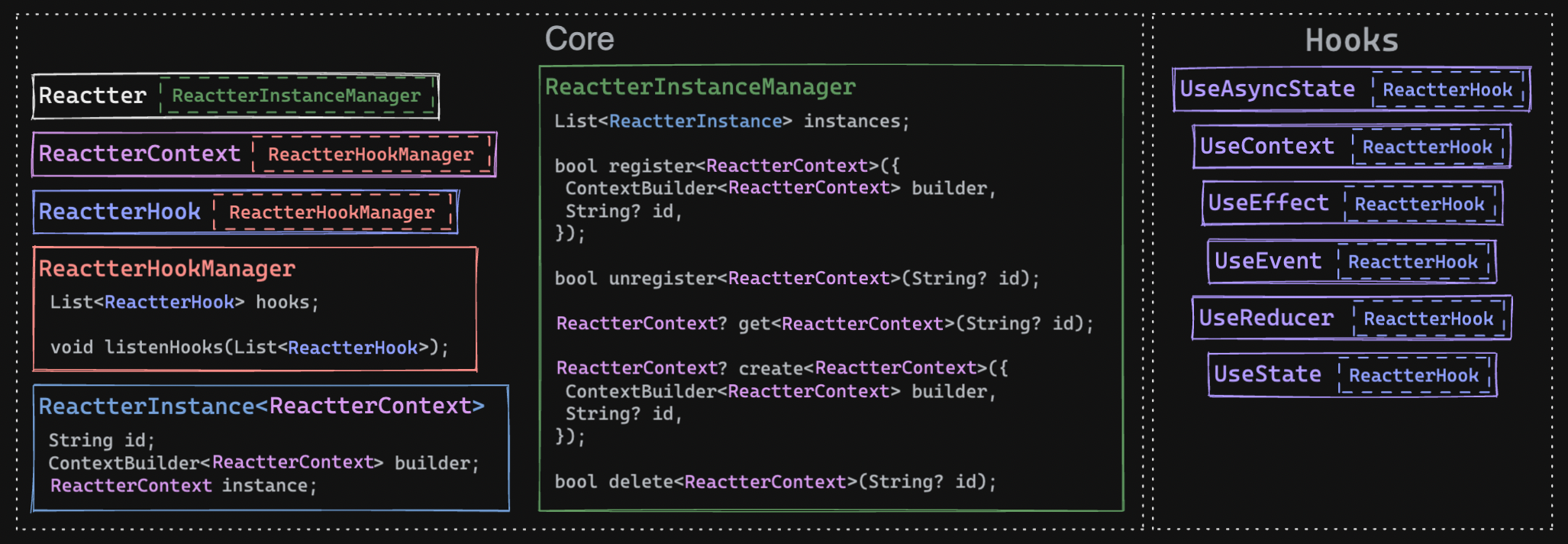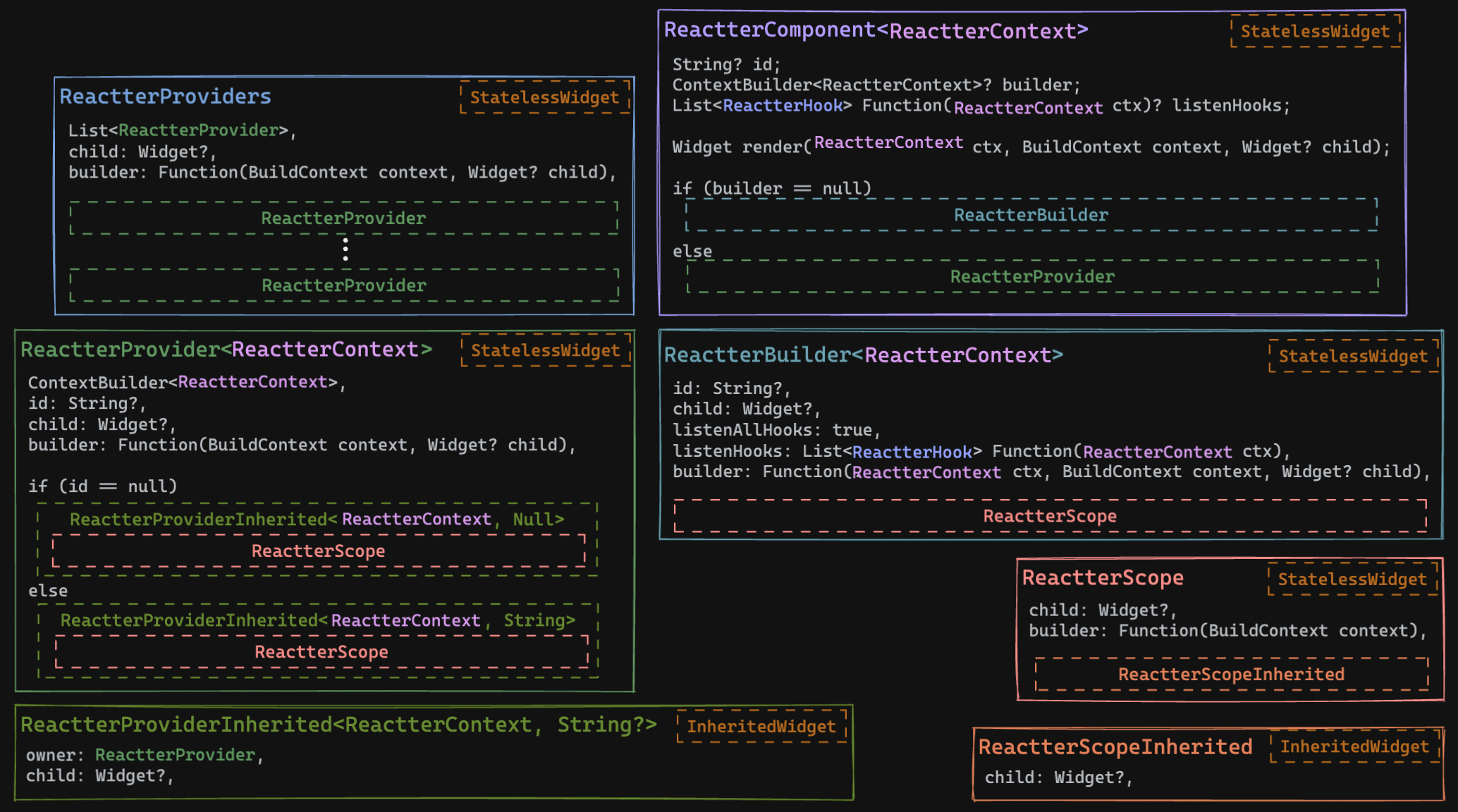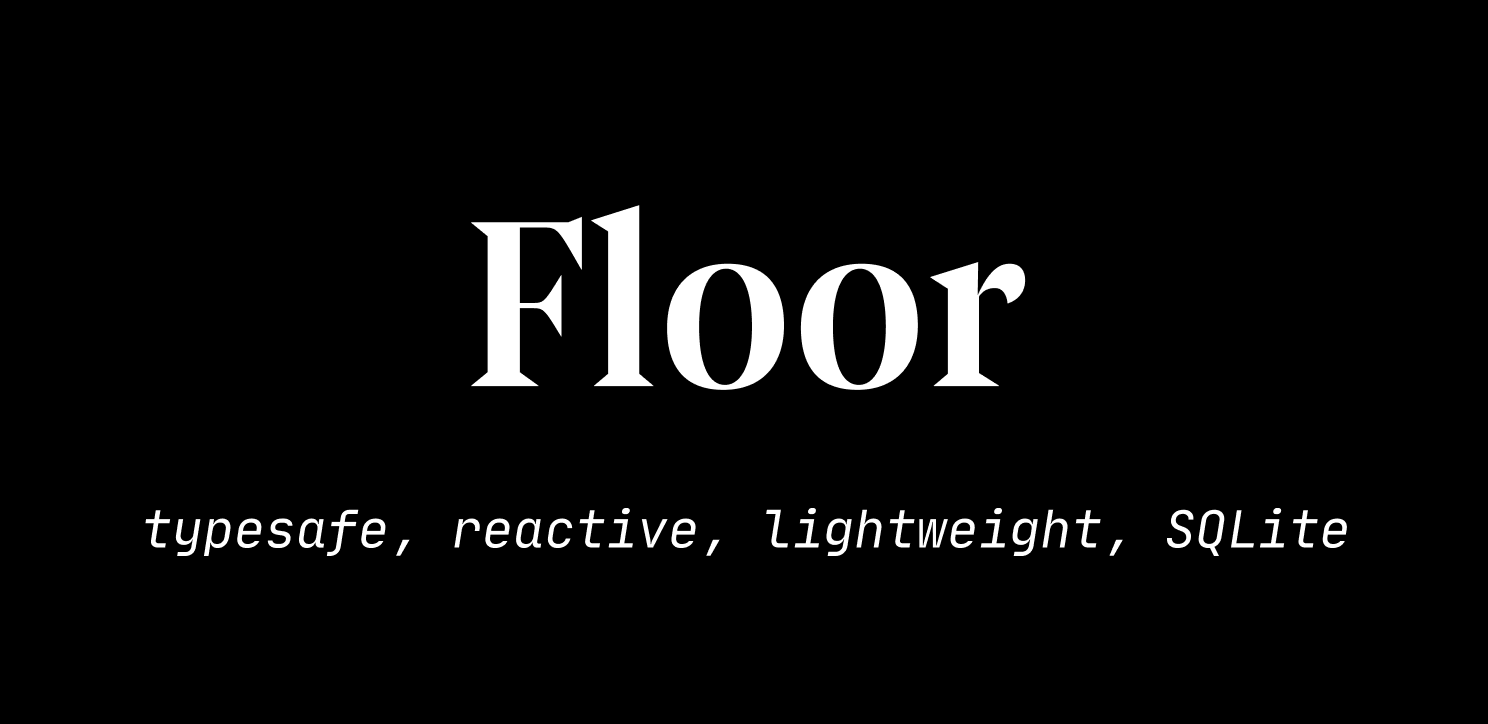A light, powerful and reactive state management.
Features
-
⚡️ Build for speed. -
📏 Reduce boilerplate code significantly. -
📝 Improve code readability. -
🪃 Unidirectional data flow. -
♻️ Reuse state using custom hooks. -
🪄 No configuration necessary. -
🎮 Total control to re-render widget tree. -
💙 Flutter or Dart only, you can use in any Dart project.
Contents
Quickstart
Before anything, you need to be aware that Reactter is distributed on two packages, with slightly different usage.
The package of Reactter that you will want to install depends on the project type you are making.
Select one of the following options to know how to install it:
Dart only 
Add the package on your project.
-
Using command:
dart pub add reactter
-
Or put directly into
pubspec.yamlfile:dependencies: reactter: #add version here
and run
dart pub get.
Now in your Dart code, you can use:
import 'package:reactter/reactter.dart';
Flutter 
Add the package on your project.
-
Using command:
flutter pub add flutter_reactter
-
Or put directly into
pubspec.yamlfile:dependencies: flutter_reactter: #add version here
and run
flutter pub get.
Now in your Dart code, you can use:
import 'package:flutter_reactter/flutter_reactter.dart';
Usage
Create a ReactterContext
ReactterContext is a abstract class that allows to manages ReactterHook and provides life-cycle events.
You can use it's functionalities, creating a class that extends it:
class AppContext extends ReactterContext {}
RECOMMENDED: Name class with
Contextsuffix, for easy locatily.
Lifecycle of ReactterContext
ReactterContext has the following Lifecycle events:
-
Lifecycle.registered: Event when the instance has registered byReactterInstanceManager. -
Lifecycle.unregistered: Event when the instance has unregistered byReactterInstanceManager. -
Lifecycle.inicialized: Event when the instance has inicialized byReactterInstanceManager. -
Lifecycle.willMount: Event when the instance will be mount in the widget tree (it use withflutter_reactteronly). -
Lifecycle.didMount: Event when the instance did be mount in the widget tree (it use withflutter_reactteronly). -
Lifecycle.willUpdate: Event when any instance's hooks will be update. Event param is aReactterHook. -
Lifecycle.didUpdate: Event when any instance's hooks did be update. Event param is aReactterHook. -
Lifecycle.willUnmount: Event when the instance will be unmount in the widget tree(it use withflutter_reactteronly). -
Lifecycle.destroyed: Event when the instance did be destroyed byReactterInstanceManager.
You can put it on listen, using UseEvent, for example:
UseEvent<AppContext>().on<ReactterHook>(
Lifecycle.didUpdate,
(inst, hook) => print("Instance: $inst, hook: $hook"),
);
Manage instance with ReactterInstanceManage
ReactterInstanceManager is a instance of Reactter that exposes some methods to manages instance. These are some methods:
Reactter.register: Registers a builder function to allows to create the instance using Reactter.get.
Reactter.register(builder: () => AppContext());
Reactter.register(id: "uniqueId", builder: () => AppContext());
Reactter.unregister: Removes the builder function to avoid create the instance.
Reactter.unregister<AppContext>();
Reactter.unregister<AppContext>("uniqueId");
Reactter.get: Gets the previously instance created or creates a new instance from the build registered using reactter.register.
final appContext = Reactter.get<AppContext>();
final appContextWithId = Reactter.get<AppContext>(id: 'uniqueId');
Reactter.create: Registers, creates and gets the instance directly.
final appContext = Reactter.create(build: () => AppContext());
final appContextWithId = Reactter.create(id: 'uniqueId', build: () => AppContext());
Reactter.delete: Deletes the instance but still keep the build function.
Reactter.delete<AppContext>();
Reactter.delete<AppContext>('uniqueId');
NOTE: The registered instances have a global scope. This means that you can access them anywhere in the project just by using
Reactter.getor throughUseContext.
Using UseContext hook
UseContext is a ReactterHook that allows to get ReactterContext's instance when it's ready.
class AppContext extends ReactterContext {
late final otherContextHook = UseContext<OtherContext>(context: this);
// final otherContextHookWithId = UseContext<OtherContext>(id: "uniqueId", context: this);
late otherContext = otherContext.instance;
AppContext() {
UseEffect(() {
otherContext = otherContextHook.instance;
}, [otherContextHook]);
}
}
NOTE: If you're not sure that you got the instance from the beginning, you need to use the
UseEffectas shown in the example above.NOTE: The context that you need to get, must be created by
ReactterInstanceManager.
Using UseEvent hook
UseEvent is a ReactterHook that manages events.
You can listen to event using on method:
enum Events { SomeEvent };
void _onSomeEvent(inst, param) {
print("$inst's Events.SomeEvent emitted with param: $param.");
}
UseEvent<AppContext>().on(Events.SomeEvent, _onSomeEvent);
Use off method to stop listening event:
UseEvent<AppContext>().off(Events.SomeEvent, _onSomeEvent);
If you want to listen event only once, use one method:
UseEvent<AppContext>().one(Events.SomeEvent, _onSomeEvent);
And use emit method to trigger event:
UseEvent<AppContext>().emit(Events.SomeEvent, 'Parameter');
IMPORTANT: Don't forget to remove event using
offor usingdisposeto remove all instance's events. Failure to do so could increase memory usage or have unexpected behaviors, such as events in permanent listening.RECOMMENDED: If you have the instance, use directly with
UseEvent.withInstance(<instance>).
Using UseState hook
UseState is a ReactterHook that manages a state.
You can add it on any part of class, with the context argument(this) to put this hook on listen:
class AppContext extends ReactterContext {
late final count = UseState(0, this);
}
or add it into listenHooks method which is exposed by ReactterContext:
class AppContext extends ReactterContext {
final count = UseState(0);
AppContext() {
listenHooks([count]);
}
}
NOTE: If you don't add context argument or use
listenHook, theReactterContextwon't be able to react to hook's changes.
UseState has value property that allows to read and write its state:
class AppContext extends ReactterContext {
late final count = UseState(0, this);
AppContext() {
print("Prev state: ${count.value}");
count.value = 10;
print("Current state: ${count.value}");
}
}
NOTE:
UseStatenotifies that its state has changed when the previous state is different from the current state. If its state is aObject, not detect internal changes, only when states is setted anotherObject.
If you want to force notify, execute update method, which is exposed by UseState.
class Todo {
String name;
Todo(this.name);
}
class AppContext extends ReactterContext {
final todoState = UseState(Todo('Do this'), this);
AppContext() {
todoState.update(() {
todoState.value.name = 'Do this other';
});
}
}
Using UseAsyncState hook
UseAsyncState is a ReactterHook with the same functionality as UseState but provides a asyncValue method, which will be obtained when resolve method is executed.
class TranslateArgs {
final String to;
final String from;
final String text;
TranslateArgs({ this.to, this.from, this.text });
}
class AppContext extends ReactterContext {
late final translateState = UseAsyncStates<String, TranslateArgs>(
'Hello world',
translate,
this,
);
AppContext() {
_init();
}
Future<void> _init() async {
await translateState.resolve(
TranslateArgs({
to: 'ES',
from: 'EN',
text: translateState.value,
}),
);
print("'Hello world' translated to Spanish: '${translateState.value}'");
}
Future<String> translate([TranslateArgs args]) async {
return await api.translate(args);
}
}
NOTE: If you want to send argument to
asyncValuemethod, need to define a type argument which be send throughresolvemethod. Like the example shown above, the argument type send isTranslateArgsclass.
It also has when method that returns a new value depending on it's state:
final valueComputed = asyncState.when<String>(
standby: (value) => "⚓️ Standby: $value",
loading: (value) => "⏳ Loading...",
done: (value) => "✅ Resolved: $value",
error: (error) => "❌ Error: $error",
);
Using UseReducer hook
UseReducer is a ReactterHook that manages state using reducer method. An alternative to UseState.
RECOMMENDED:
UseReduceris usually preferable toUseStatewhen you have complex state logic that involves multiple sub-values or when the next state depends on the previous one.
UseReducer accepts three arguments:
UseReducer(<reducer>, <initialState>, <context>);
- The
reducermethod contains your custom state logic that calculates the new state using current state, and actions. - The
initialStateis a unique value of any type with which you initialize the state. - The
contextrepresents any instance of theReactterContextwhich is notified of any change in state.
UseReducer exposes a dispatch method that allows to invoke the reducer method sending a ReactterAction.
The current state can be access through value property.
Here's the counter example:
class Store {
final int count;
Store({this.count = 0});
}
Store _reducer(Store state, ReactterAction<String, int?> action) {
switch (action.type) {
case 'INCREMENT':
return Store(count: state.count + (action.payload ?? 1));
case 'DECREMENT':
return Store(count: state.count + (action.payload ?? 1));
default:
throw UnimplementedError();
}
}
class AppContext extends ReactterContext {
late final state = UseReducer(_reducer, Store(count: 0), this);
AppContext() {
print("count: ${state.value.count}"); // count: 0;
state.dispatch(ReactterAction(type: 'INCREMENT', payload: 2));
print("count: ${state.value.count}"); // count: 2;
state.dispatch(ReactterAction(type: 'DECREMENT'));
print("count: ${state.value.count}"); // count: 1;
}
}
Also, you can create the actions as a callable class, extending from ReactterActionCallable and use them like this:
class Store {
final int count;
Store({this.count = 0});
}
class IncrementAction extends ReactterActionCallable<Store, int> {
IncrementAction({int quantity = 1}) : super(type: 'INCREEMNT', payload: quantity);
@override
Store call(Store state) => Store(count: state.count + payload);
}
class DecrementAction extends ReactterActionCallable<Store, int> {
DecrementAction({int quantity = 1}) : super(type: 'DECREMENT', payload: quantity);
@override
Store call(Store state) => Store(count: state.count - payload);
}
Store _reducer(Store state, ReactterAction action) =>
action is ReactterActionCallable ? action(state) : UnimplementedError();
class AppContext extends ReactterContext {
late final state = UseReducer(_reducer , Store(count: 0), this);
AppContext() {
print("count: ${state.value.count}"); // count: 0;
state.dispatch(IncrementAction(quantity: 2));
print("count: ${state.value.count}"); // count: 2;
state.dispatch(DecrementAction());
print("count: ${state.value.count}"); // count: 1;
}
}
Using UseEffect hook
UseEffect is a ReactterHook that manages side-effect.
You can add it on constructor of class:
class AppContext extends ReactterContext {
late final count = UseState(0, this);
AppContext() {
UseEffect((){
// Execute by count state changed or 'didMount' event
print("Count: ${count.value}");
Future.delayed(
const Duration(seconds: 1),
() => count.value += 1,
);
return () {
// Cleanup - Execute Before count state changed or 'willUnmount' event
print("Cleanup executed");
};
}, [count], this);
}
}
If you want to execute a UseEffect immediately, use UseEffect.dispatchEffect instead of the context argument:
UseEffect(
() => print("Excute immediately or by hook's changes"),
[someHook],
UseEffect.dispatchEffect
);
NOTE: If you don't add
contextargument toUseEffect, thecallbackdon't execute on lifecycledidMount, and thecleanupdon't execute on lifecyclewillUnmount(theses lifecycle events are used withflutter_reactteronly).
Create a ReactterHook
ReactterHook is a abstract class that allows to create a Custom Hook.
There are several advantages to using Custom Hooks:
- Reusability: you can use the same hook again and again, without the need to write it twice.
- Clean Code: extracting part of context logic into a hook will provide a cleaner codebase.
- Maintainability: easier to maintain. if we need to change the logic of the hook, you only need to change it once.
Here's the counter example:
class UseCount extends ReactterHook {
int _count = 0;
int get value => _count;
UseCount(int initial, [ReactterContext? context])
: _count = initial,
super(context);
void increment() => update(() => _count += 1);
void decrement() => update(() => _count -= 1);
}
RECOMMENDED: Name class with
Usepreffix, for easy locatily.NOTE:
ReactterHookprovidesupdatemethod which notify tocontextthat has changed.
and use it like that:
class AppContext extends ReactterContext {
late final count = UseCount(0, this);
AppContext() {
UseEffect(() {
Future.delayed(
const Duration(seconds: 1),
count.increment,
);
print("Count: ${count.value}");
}, [count], this);
}
}
Global state
The reactter's hooks can be defined as static to access its as global way:
class Global {
static final flag = UseState(false);
static final count = UseCount(0);
// Create a class factory to run it as singleton way.
// This way, the initial logic can be executed.
static final Global _inst = Global._init();
factory Global() => _inst;
Global._init() {
UseEffect(() {
Future.delayed(const Duration(seconds: 1), changeCount);
}, [count], UseEffect.dispatchEffect);
}
static void changeCount() {
if (count.value <= 0) {
flag.value = true;
}
if (count.value >= 10) {
flag.value = false;
}
flag.value ? count.increment() : count.decrement();
}
}
// It's need to create the instance it to be able
// to execute Global._init(This executes only once).
final global = Global();
This is a example that how you could use it:
class AppContext extends ReactterContext {
late final isOdd = UseState(false, this);
AppContext() {
UseEffect((){
isOdd.value = Global.count.value % 2 != 0;
}, [Global.count], this);
}
}
NOTE: If you want to execute some logic when initialize the global class, you need to use the class factory and then instance it to run as singleton way.
Usage with flutter_reactter
Wrap with ReactterProvider
ReactterProvider is a wrapper StatelessWidget that provides a ReactterContext's instance to widget tree that can be access through the BuildContext.
ReactterProvider(
() => AppContext(),
builder: (context, child) {
final appContext = context.watch<AppContext>();
return Text("count: ${appContext.count.value}");
},
)
If you want to create a different ReactterContext's instance, use id parameter.
ReactterProvider(
() => AppContext(),
id: "uniqueId",
builder: (context, child) {
final appContext = context.watchId<AppContext>("uniqueId");
return Text("count: ${appContext.count.value}");
},
)
IMPORTANT: Dont's use
ReactterContextwith constructor parameters to prevent conflicts. Instead useonInitmethod to access its instance and put the data you need.NOTE:
ReactteProvideris a "scoped". So it contains aReactterScopewhich thebuildercallback will be rebuild, when theReactterContextchanges. For this to happen, theReactterContextshould put it on listens forBuildContext'swatchers.
Access to ReactterContext
Reactter provides additional methods to BuildContext to access your ReactterContext. These are following:
context.watch: Gets theReactterContext's instance from the closest ancestor ofReactterProviderand watch allReactterHookorReactterHookdefined in first paramater.
final watchContext = context.watch<WatchContext>();
final watchHooksContext = context.watch<WatchHooksContext>(
(ctx) => [ctx.stateA, ctx.stateB],
);
context.watchId: Gets theReactterContext's instance withidfrom the closest ancestor ofReactterProviderand watch allReactterHookorReactterHookdefined in second paramater.
final watchIdContext = context.watchId<WatchIdContext>('id');
final watchHooksIdContext = context.watchId<WatchHooksIdContext>(
'id',
(ctx) => [ctx.stateA, ctx.stateB],
);
context.use: Gets theReactterContext's instance with/withoutidfrom the closest ancestor ofReactterProvider.
final readContext = context.use<ReadContext>();
final readIdContext = context.use<ReadIdContext>('id');
NOTE: These methods mentioned above uses
ReactterProvider.contextOfNOTE:
context.watchandcontext.watchIdwatch all or some of the specifiedReactterHookdependencies and when it will change, re-render widgets in the scope ofReactterProviders,ReactterBuilderorReactterScope.
Control re-render with ReactterScope
ReactterScope is a wrapeer StatelessWidget that to to control re-rendered of widget tree.
ReactterScope<AppContext>(
builder: (context, child) {
final appContext = context.watch<AppContext>();
return Text("Count: ${appContext.count.value}");
},
)
NOTE: The
buildercallback will be rebuild, when theReactterContextchanges. For this to happen, theReactterContextshould put it on listens forBuildContext'swatchers.
Control re-render with ReactterBuilder
ReactterBuilder is a wrapper StatelessWidget that to to get the ReactterContext's instance from the closest ancestor of ReactterProvider and exposes it through the first parameter of builder callback.
ReactterBuilder<AppContext>(
listenAllHooks: true,
builder: (appContext, context, child) {
return Text("Count: ${appContext.count.value}");
},
)
NOTE:
ReactterBuilderis read-only by default(listenAllHooks: false), this means it only renders once. Instead uselistenAllHooksastrueor uselistenHookswith theReactterHooks specific and then thebuildercallback will be rebuild with everyReactterContext'sReactterHookchanges.NOTE:
ReactterBuilderis a "scoped". So it contains aReactterScopewhich thebuildercallback will be rebuild, when theReactterContextchanges. For this to happen, theReactterContextshould put it on listens forBuildContext'swatchers.
Multiple ReactterProvider with ReactterProviders
ReactterProviders is a wrapper StatelessWidget that allows to use multiple ReactterProvider as nested way.
ReactterProviders(
[
ReactterProvider(() => AppContext()),
ReactterProvider(
() => ConfigContext(),
id: 'App',
onInit: (appConfigContext) {
appConfigContext.config.value = 'new state';
},
),
ReactterProvider(
() => ConfigContext(),
id: 'User'
),
],
builder: (context, child) {
final appContext = context.watch<AppContext>();
final appConfigContext = context.watchId<ConfigContext>('App');
final userConfigContext = context.watchId<ConfigContext>('User');
...
},
)
Create a ReactterComponent
ReactterComponent is a abstract StatelessWidget class that provides the functionality of ReactterProvider with a ReactterContext and exposes it through render method.
class CounterComponent extends ReactterComponent<AppContext> {
const CounterComponent({Key? key}) : super(key: key);
@override
get builder => () => AppContext();
@override
get id => 'uniqueId';
@override
listenHooks(appContext) => [appContext.stateA];
@override
Widget render(appContext, context) {
return Text("StateA: ${appContext.stateA.value}");
}
}
Resources
Roadmap
We want to keeping adding features for Reactter, those are some we have in mind order by priority:
- Widget to control re-render using only hooks
- Async context.
- Do benchmarks and improve performance.
Contribute
If you want to contribute don't hesitate to create an issue or pull-request in Reactter repository.
You can:
- Provide new features.
- Report bugs.
- Report situations difficult to implement.
- Report an unclear error.
- Report unclear documentation.
- Add a new custom hook.
- Add a new widget.
- Add examples.
- Translate documentation.
- Write articles or make videos teaching how to use Reactter.
Any idea is welcome!











![👘 [FUNCTIONAL REACTIVE PROGRAMMING].💎 The main purpose of repository is learning. 📘 A FLUTTER app help student find room 🏠 Using BLoC pattern with RxDart library, firebase as backend, .... Star 🌟 if it is helful 💓 . In progress... :zap:](https://github.com/hoc081098/find_room_flutter_BLoC_pattern_RxDart/raw/master/art/Screenshot_01.png)


